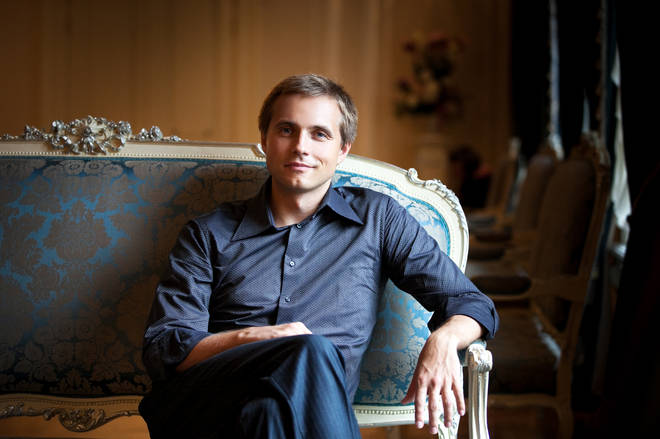– it’s a direct link from heart to heart’

The Russian maestro speaks to Classic FM about becoming music director of the Royal Philharmonic Orchestra, and the orchestra’s exciting new partnership with the Royal Albert Hall.
We meet Vasily Patrenko on a rainy London day, and seek shelter inside the curved walls of the Royal Albert Hall.
The RPO’s announcement of its partnership with the Royal Albert Hall is an exciting development for both the orchestra, which will continue to also be based at Cadogan Hall where it has been since 2004, and the venue, which hosts a range of classical and non-classical music events throughout the year.
And new research by the RPO suggests there is no better springboard for British orchestral music than the Royal Albert Hall. A poll they conducted saw the Royal Albert Hall top the list of UK concert venues with 58 per cent of respondents saying that it showcases the best of what Britain does. It was followed by Glastonbury (53 per cent) and Wembley Stadium (27 per cent).
“It’s a great honour and a great pleasure to come to London and work with the Royal Philharmonic Orchestra. The orchestra has a great history and a great present, and, I hope, an even better future,” Petrenko tells Classic FM.
The collaboration with the Royal Albert Hall will start with performances of Mahler’s Symphonies Nos. 2, 3 and 8, and there are a lot of plans for tours and concerts in London, and beyond.
“It’s the next part of the orchestra’s journey so there’s also plenty of hard work to come,” Petrenko laughs.
The Mahler selections Petrenko has planned with the RPO have been carefully chosen for the sheer size of forces required, both orchestral and choral, which suit the Albert Hall’s huge space. These will accompany the full Mahler Symphony Cycle Petrenko will conduct with the Royal Liverpool Philharmonic Orchestra before he says farewell.
What’s so special about Mahler’s symphonies?
Petrenko made his debut with the RPO at the Royal Albert Hall in March 2016, with a powerful rendition of Mahler’s Symphony No.2, ‘Resurrection’.
Speaking about his choices of Mahler this time around, Petrenko says: “They’re all great symphonies and they’re all explorations of the human spirit. This was the first time the symphonic genre became truly existential; a search of what the life of the human in the modern world means.
“Mahler raised existential questions such as: why is the world is so beautiful, but humans suffer so much? And those questions are eternal; they exist very much now as they did then.”
For Petrenko, Mahler’s symphonies raise spiritual questions about society versus the individual. And perhaps no musical group is as representative of the coming together of society than the symphony orchestra.
“I prefer always to work together for progress and I’m always trying to see the world as one working together for the future,” the conductor explains.
“An orchestra is a great example of this working together – of how many people of different nationalities and playing different instruments are all working together to create something amazing. I really believe in such things more than in the division and in the small segments.”
The RPO’s appointment with the Albert Hall, which seats over 5,000 people, will especially help to bring the wonderful force of a symphony orchestra to a wider audience.
“The most important thing is the sense of discovery and the sense of inclusivity – in terms of the public who will be welcomed to the concerts. There is also the importance of diversity and making classical music accessible to anyone.
“To understand classical music you need no language – it’s a direct link from heart to heart,” is how Petrenko puts it, rather poignantly.
“Classical music is a huge part of my life and has always been, and to live without it would make my life empty.”
No comments:
Post a Comment